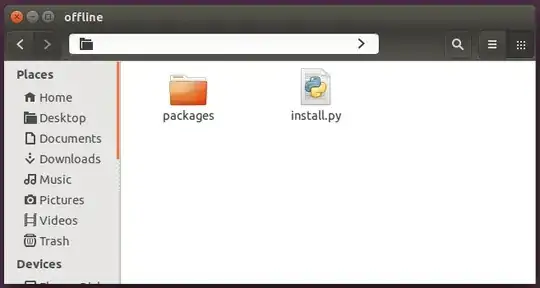Topological sort (via script)
The command dpkg -i packages/*.deb
Custom script to rule them all
Under the assumption your debian distro has python installed (mine is ubuntu 14.04 LTS and comes with python27)
Aside the offline .deb packages directory, provide a script that;
- Extract metadata and Topological sorts all candidate packages
- Uses
dpkg -i to install the sorted packages in proper order they should be installed
For example, execute this command to install all pre-collected offline packages
sudo python install.py
install.py
#!/usr/bin/env python
import os
import re
import subprocess
import logging
import sys
rootLogger = logging.getLogger()
rootLogger.setLevel(logging.INFO)
consoleHandler = logging.StreamHandler(sys.stdout)
consoleHandler.setFormatter(logging.Formatter("%(asctime)s - %(levelname)s - %(message)s"))
rootLogger.addHandler(consoleHandler)
SCRIPT_DIR = os.path.dirname(os.path.realpath(__file__))
class TopologicalSort(object):
def __init__(self, dependency_map):
self._dependency_map = dependency_map
self._already_processed = set()
def _get_dependencies(self, item, root=None):
if not root:
root = item
elif root == item:
logging.warn("circular dependency detected in '{}'".format(item))
raise StopIteration()
dependencies = self._dependency_map.get(item, [])
for dependency in dependencies:
if dependency in self._already_processed:
continue
self._already_processed.add(dependency)
for sub_dependency in self._get_dependencies(dependency, root=root):
yield sub_dependency
yield dependency
def sort(self):
# Reduction, connect all nodes to a dummy node and re-calculate
special_package_id = 'topological-sort-special-node'
self._dependency_map[special_package_id] = self._dependency_map.keys()
sorted_dependencies = self._get_dependencies(special_package_id)
sorted_dependencies = list(sorted_dependencies)
del self._dependency_map[special_package_id]
# Remove "noise" dependencies (only referenced, not declared)
sorted_dependencies = filter(lambda x: x in self._dependency_map, sorted_dependencies)
return sorted_dependencies
class DebianPackage(object):
def __init__(self, file_path):
metadata = subprocess.check_output('dpkg -I {}'.format(file_path), shell=True)
metadata = metadata.replace('\n ', '\n')
self._metadata = metadata
self.id = self._get('Package')
self.dependencies = list(self._get_dependencies())
self.file_path = file_path
def _get_dependencies(self):
dependencies = self._get('Depends') + ',' + self._get('Pre-Depends')
dependencies = re.split(r',|\|', dependencies)
dependencies = map(lambda x: re.sub(r'\(.*\)|:any', '', x).strip(), dependencies)
dependencies = filter(lambda x: x, dependencies)
dependencies = set(dependencies)
for dependency in dependencies:
yield dependency
def _get(self, key):
search = re.search(r'\n{key}:(.*)\n[A-Z]'.format(key=key), self._metadata)
return search.group(1).strip() if search else ''
def sort_debian_packages(directory_path):
file_names = os.listdir(directory_path)
debian_packages = {}
dependency_map = {}
for file_name in file_names:
file_path = os.path.join(directory_path, file_name)
if not os.path.isfile(file_path):
continue
debian_package = DebianPackage(file_path)
debian_packages[debian_package.id] = debian_package
dependency_map[debian_package.id] = debian_package.dependencies
sorted_dependencies = TopologicalSort(dependency_map).sort()
sorted_dependencies = map(lambda package_id: debian_packages[package_id].file_path, sorted_dependencies)
return sorted_dependencies
def main():
# ------------------
# Sort the packages using topological sort
packages_dir_path = os.path.join(SCRIPT_DIR, 'packages')
logging.info('sorting packages in "{}" using topological sort ...'.format(packages_dir_path))
sorted_packages = sort_debian_packages(packages_dir_path)
# ------------------
# Install the packages in the sorted order
for index, package_file_path in enumerate(sorted_packages):
command = 'dpkg -i {}'.format(package_file_path)
logging.info('executing "{}" ...'.format(command))
subprocess.check_call(command, shell=True)
if __name__ == '__main__':
if os.geteuid() != 0:
logging.error('must be run as root')
sys.exit(1)
try:
main()
except:
logging.error('failed to install packages', exc_info=True)
sys.exit(1)



dpkgconcerning dependency management. You can simulate the resulting actions with the--apt-lineflag. – David Foerster Dec 10 '15 at 11:48